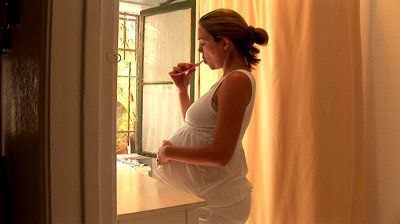Dental care in pregnant women
Get a dental check-up before you get pregnant. Pregnant women need to get enough calcium, vitamins D, C, and A, phosphorus, and protein. Avoid dental work during the first and last trimesters of pregnancy.
The ancients used to say "each time you give birth, you lose a tooth". Now, from a professional and scientific perspective, this concept is completely wrong. The calcium needed for the fetus is not drawn from the teeth. The cause of dental problems during pregnancy is due to hormonal changes, combined with poor oral hygiene as well as changing body habits that are detrimental to the teeth during pregnancy.
 |
| It is important to maintain good oral hygiene during pregnancy. Photo illustration: drverwest |
Pregnant women often have oral pathologies such as hormonal changes. Especially the increase of estrogen and progesterone during pregnancy and harmful bacterial plaque due to poor oral hygiene, leading to pregnancy gingivitis, red gums, swelling, pain, easy bleeding.
Pregnancy gingivitis is the most common dental condition associated with pregnancy and usually begins as early as the second month of pregnancy. If you already have gum disease, it may worsen during pregnancy. If left untreated, gingivitis can lead to periodontitis, which causes irreversible destruction of the tissues supporting the teeth and can lead to tooth loss.
Pregnant women are also at risk of developing soft, easily bleeding, granular lesions called granulomas of pregnancy (non-cancerous). These lesions usually disappear after delivery. If they cause discomfort or interfere with chewing and oral hygiene, your dentist may recommend removal during pregnancy.
Pregnant women often need nutrients for the fetus, so they often have the habit of snacking. Morning sickness can easily cause vomiting, causing stomach acid to demineralize teeth. This can easily lead to weak teeth and tooth decay.
Dental care for pregnant women
Try to have a dental appointment before you get pregnant. The aim is to have your teeth cleaned, your gums carefully examined by your dentist and any oral health problems treated before you get pregnant.
Eating a balanced and nutritious diet during pregnancy will help promote good oral and overall health for you and your baby. Your baby's first set of teeth will begin to develop between the third and sixth month of pregnancy, so make sure you get enough calcium, vitamins D, C and A, phosphorus and protein.
Maintain good oral hygiene during pregnancy, brushing thoroughly with fluoride toothpaste twice a day and flossing daily.
Except for emergency interventions, other dental interventions should be postponed until after the birth of the baby. If intervention is required, it should be done in the second trimester of pregnancy. Avoid intervention in the first trimester because the patient will vomit, making treatment difficult and this is the stage when the fetal organs are formed and the last trimester, when the patient is heavy, tired and cannot sit for long and there is a risk of premature birth.
According to VnExpress






